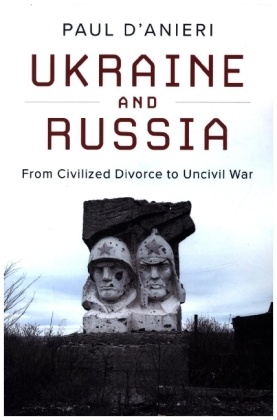
Ukraine and Russia - From Civilied Divorce to Uncivil War
| Verlag | Cambridge University Press |
| Auflage | 2019 |
| Seiten | 292 |
| Format | 15,3 x 22,8 x 1,4 cm |
| Gewicht | 480 g |
| Artikeltyp | Englisches Buch |
| EAN | 9781108713955 |
| Bestell-Nr | 10871395UA |
Explores the long-term dynamics of international conflict between Ukraine, Russia and the West, revealing the historic roots of a 'new Cold War'.
D'Anieri explores the dynamics within Ukraine, between Ukraine and Russia, and between Russia and the West, that emerged with the collapse of the Soviet Union and eventually led to war in 2014. Proceeding chronologically, this book shows how Ukraine's separation from Russia in 1991, at the time called a 'civilized divorce', led to what many are now calling 'a new Cold War'. He argues that the conflict has worsened because of three underlying factors - the security dilemma, the impact of democratization on geopolitics, and the incompatible goals of a post-Cold War Europe. Rather than a peaceful situation that was squandered, D'Anieri argues that these were deep-seated pre-existing disagreements that could not be bridged, with concerning implications for the resolution of the Ukraine conflict. The book also shows how this war fits into broader patterns of contemporary international conflict and should therefore appeal to researchers working on the Russia-Ukraine conflict, Russia's r elations with the West, and conflict and geopolitics more generally.
Inhaltsverzeichnis:
1. The sources of conflict over Ukraine; 2. New world order? 1989-1993; 3. Hope and hardship, 1994-1999; 4. Autocracy and revolution: 1999-2004; 5. Revolution and reversal, 2004-2010; 6. Viktor Yanukovych and the path to confrontation, 2010-2013; 7. From revolution to war: 2013-2015; 8. Conclusion: Ukraine, Russia, and the West: from Cold War to Cold War.
Rezension:
'Who or what is responsible for the war in Ukraine and the new crisis in the East-West relations? Paul D'Anieri is not looking for simple answers to this seemingly simple question. His response is rooted in the examination of the Russo-Ukrainian relations over the past thirty years and points to profound differences in the way Russian and Ukrainian elites understand and pursue their interests in the post-Cold War world. A work of great erudition, this book contributes to more than one field of study and is a must read for anyone who is interested in the origins of the current crisis.' Serhii Plokhy, Mykhailo S. Hrushevs'kyi Professor of Ukrainian History, Harvard University, Massachusetts
